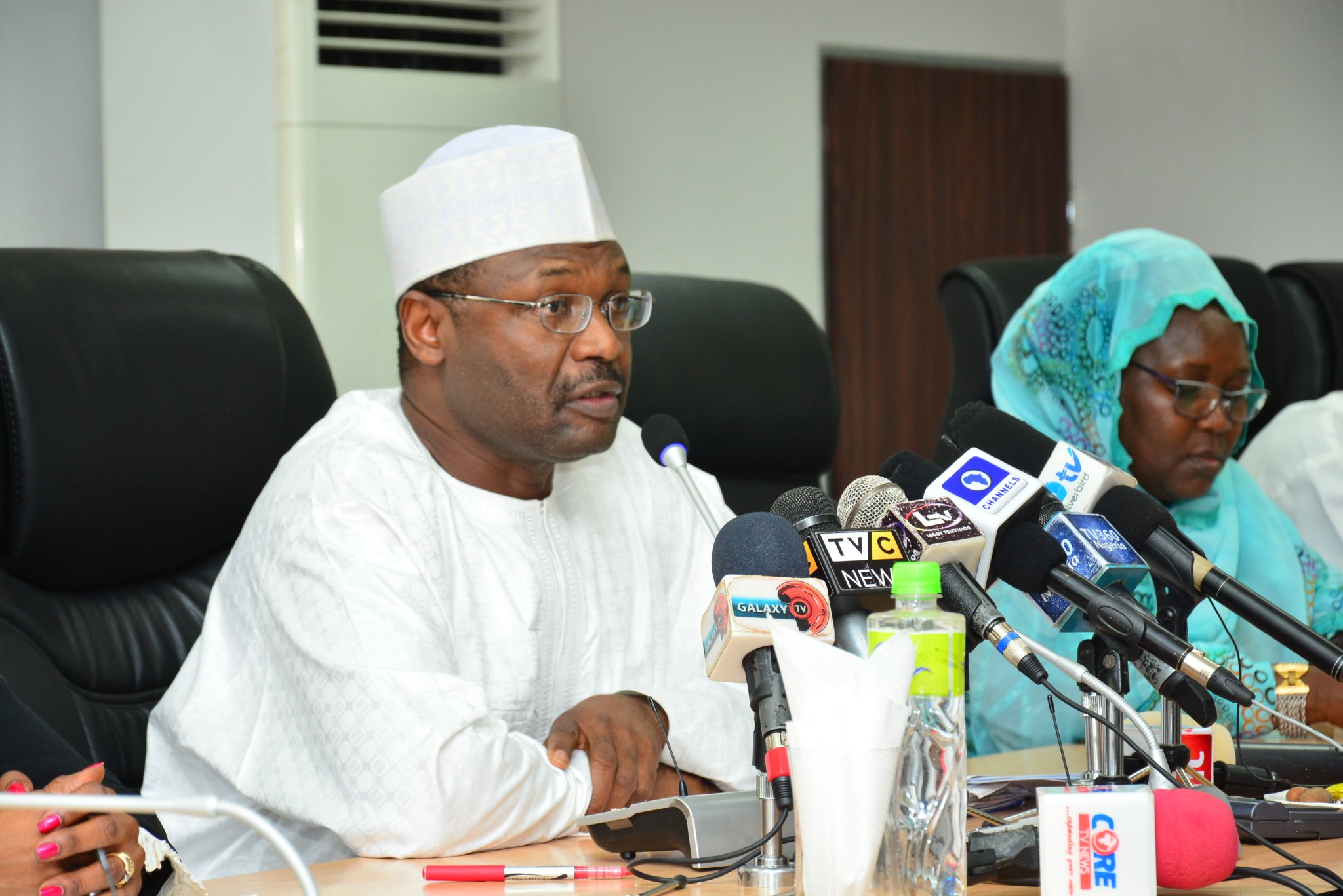Electronic Voting Machine, EVM, will be used for future elections in the country beginning from next year, the Independent National Electoral Commission, INEC, has indicated on Monday, May 25, 2020.
But, the forthcoming governorship elections in Edo and Ondo states will run on the existing order, the agency added.
It said its decision on e-voting is in line with the demands by Nigerians to deepen the use of technology to conduct elections.
The agency has suspended Continuous Registration of Voters, CVR, to prevent the health risks associated with it as a result of COVID-19.
According to the details of the conduct of elections and voting in line with the guidelines for the management of Coronavirus Disease as released yesterday, polling unit layout shall be redesigned with e periodic disinfection of chairs, tables, and work areas, as well as adequate ventilation.
It said the threshold for Voting Points shall be increased from 500/750 to 1,000/1,250.
It also clarified that any voter who does not wear a face mask will be disenfranchised.
The commission also unveiled as part of “Policy on Conducting Elections in the Context of the COVID-19 Pandemic,” uploaded on its website that:
“The Commission recognises the critical role that ICT will play in an electoral process that is being vastly reshaped by the COVID-19 pandemic, as well as the growing demands by Nigerians for the deepening of the use of technology in our elections.
“Consequently, the Commission shall:
- Continue to apply relevant, value-for-money technology in all aspects of the electoral process and election management.
- Regularly validate and clean up the biometric Register of Voters by removing multiple registrants and deceased persons.
- Suspend the Continuous Registration of Voters, CVR, for the time being to prevent the health risks associated with it in the context of COVID-19.
- Continue to make available its electronic channels for voters to check their registration status.
- Pilot the use of Electronic Voting Machines at the earliest possible time (not Edo and Ondo), but work towards the full introduction of electronic voting in major elections starting from 2021.
Although the commission was not specific on whether it will seek constitutional backing for EVM, it said it acted in line with Section 160 (1) of the 1999 Constitution (as amended) and Section 153 of the Electoral Act 2010 (as amended),
It said: “Section 160 (1) of the 1999 Constitution (as amended) empowers the Independent National Electoral Commission, INEC, to by rules or otherwise, regulate its own procedure or confer powers and impose duties on any officer or authority for the purpose of discharging its functions. The Commission is also empowered by Section 153 of the Electoral Act 2010 (as amended) to issue regulations, guidelines, and manuals for the purpose of giving effect to the provisions of the Act.”
On the governorship elections in Edo and Ondo states, it said: “As already announced by the Commission, the dates for the Governorship elections in Edo and Ondo states remain 19th September 2020 and 10th October 2020 respectively.
“Dates for the four postponed by-elections in Bayelsa, Imo and Plateau States, as well as other by-elections that become due during the COVID-19 pandemic will be announced by the Commission following its established procedures.
“The Commission will engage with the legislature and other stakeholders to explore ways of responding to the rising cost of conducting frequent by-elections, especially in consideration of the Supreme Court position that votes belong primarily to political parties, as well as the Commission’s records, which show that only in 10% of all by-elections since 2015 did the party that won originally lose the election.
“The Commission will engage relevant authorities, including the legislature, to designate election as an essential service to enable the Commission function effectively in times of national emergency.”
“Conducting elections in a pandemic such as COVID-19 is yet uncharted waters. Only very few jurisdictions have any experience with this.
“That notwithstanding, the Commission is committed to conducting all elections that are due within the extant legal framework. However, in so doing it will put a premium on public safety and mitigation of health risks from COVID-19. Citizens must be assured that they will be safe while participating as voters, candidates, and officials.”
On the conduct of election during the COVID-19 pandemic, INEC said it will enforce a no face mask, no voting measure.
It also said Methylated Spirit and cotton wool will be provided for the disinfection of the Smart Card Readers, SCRs.
It said: “The most immediate challenge that COVID-19 poses to the electoral process is health-related. In order to protect voters, election officials, and other stakeholders in the electoral process, the Commission shall implement the following: Infrared thermometers will be supplied and used at the Registration Area Collation Centres, the Local Government Area Collation Centres and the State Collation Centres.
“The use of face masks is mandatory for all involved in the election process and must be worn at all election locations. The Commission shall provide face masks for all election officials.
“Alcohol-based hand sanitizers will be provided for election officials at the polling units. Methylated Spirit and cotton wool will be provided for the disinfection of the Smart Card Readers, SCRs after the fingerprint of each voter is read.
“The rules of physical distancing shall be enforced at all election activities, including stakeholder engagements, training, queuing at Polling Units, etc.
“All protocols issued by the NCDC, Presidential Task Force on COVID-19, State Committees on COVID-19, and other relevant health authorities shall be observed by election officials and all stakeholders.
“The Commission shall work with the PTF and health authorities to have in place a system of voluntary COVID-19 testing for INEC staff before and after deploying for elections. “
As for voters and Election Officials showing symptoms of COVID – 19, the policy said: “The Commission shall work with the Presidential Task Force on COVID-19 and health authorities in the states having elections to develop a protocol for dealing with persons who show symptoms of COVID-19 at election venues.
“Where an election official, a voter or any other person present at an election venue shows symptoms of COVID-19, the prevailing protocol shall be observed; the person must be isolated; from other persons at the venue; the attention of the security personnel should be drawn; the dedicated number for COVID – 19 emergencies shall be called; and if the affected person is an election official, the Commission must be notified through the Resident Electoral Commissioner, REC.”
INEC also came up with a long list of protocols for the conduct of elections and voting.
It added: “All ad hoc staff databases in the commission will be harmonized for better management. To reduce the risk of transmission of COVID-19, the Commission shall reduce to a minimum interstate movement of staff, including ad hoc staff, for off-season and by-elections.
“The rule shall be that only shortfalls requested by the States are filled from outside the state. As much as possible, all election staff will be sourced in-state. d. Transportation of election staff shall comply with COVID-19 containment protocols.
“Consequently, there shall be a reduction in the number of passengers per vehicle on election day from 14 to 7 for buses, and from 12 to 6 for boats. Motorcycles and tricycles must be used sparingly with one passenger per motorcycle and two per tricycle. All passengers and drivers must wear face masks and it shall be mandatory and the responsibility of vehicle owners to provide hand sanitizers for occupants of their vehicles.
“In the establishment of Voting Points, in order to reduce the number of points in a Polling Unit to be monitored and controlled for COVID-19 compliance, the threshold for Voting Points shall be increased from 500/750 to 1,000/1,250.
“In the light of the COVID-19 pandemic, the Polling Unit layout shall be redesigned by the Commission to ensure substantial compliance with the protocols established by health authorities. Among other things, social distancing, general hygienic conduct, and enforcement of COVID-19 prevention protocols shall be emphasized in the redesign.
“There shall be a two-tier queuing system at the Polling Unit – one outside and the other in the voting area. Voters will be brought into the voting area periodically to prevent overcrowding. Tags and twines may be used to ensure crowd control and maintenance of social distance.”







